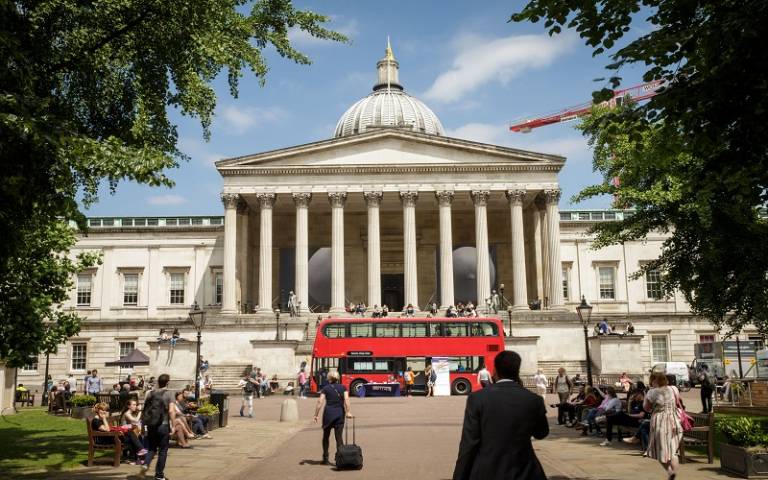UCL Festival of Culture - one week to go
27 May 2019
Now in its fourth year, the UCL Festival of Culture provides a great opportunity to discover the world-class research being carried out by staff and students from across the arts, humanities, social sciences and education.

'UCL’s Festival of Culture is brilliant at bringing UCL’s huge variety of arts, humanities and social sciences expertise to the attention of a wide audience and giving it the prominence it deserves,' says Lori Houlihan, UCL Vice-Provost (Advancement). It has become a highlight of UCL’s year, with eclectic programming and highly creative public engagement.'
‘I hope like me you will take the opportunity to celebrate the exceptional work that is being undertaken in the arts, humanities, social sciences and education across UCL. With exhibitions, film screenings, panel discussions, performances, talks and tours, there really is something for everyone,' says Professor Anthony Smith, UCL Vice-Provost (Education & Student Affairs).
This year’s UCL Festival of Culture explores some diverse issues and will bring particular research areas to life through talks, performances, tours, exhibitions, panels and screenings.
Women
- Deeds Not Words: Helen Pankhurst In Conversation: Helen Pankhurst, great-granddaughter of Emmeline Pankhurst and granddaughter of Sylvia Pankhurst, both leaders in the British suffragette movement, will be visiting UCL for a participatory discussion on women’s lives, reflecting on the changes in the UK since the right to a parliamentary vote was first granted to some women in 1918 and on priorities going forward. Monday 3 June.
- Natalie Haynes: Troy Story: Broadcaster, classicist, and star of the BBC Radio 4 series, Natalie Haynes Stands Up for the Classics, Natalie brings her unique combination of ancient history and stand-up comedy to this year’s Festival of Culture. To coincide with her latest novel, A Thousand Ships, a retelling of the story of the Trojan War from an all-female perspective, she will take audiences on a tour around Trojan War. The stories of the women whose lives the war affected have been largely untold - Natalie takes the women out of the shadows and puts them back where they belong: in the middle of the story. Wednesday 5 June.
Language
- Languages of London: Celebrating Languages and Multilingualism in the City: Explore what it means to be a multilingual speaker in the metropolis, and consider the social, cultural and communicative enrichment that multilingualism brings with it. Share your own language biographies and contribute to a languages of London map. Tuesday 4 June.
- What’s wrong with American English? (Nothing): American English is heard and spoken far more often than British English, and yet it is commonly regarded as a corrupted, invasive form of the language that needs to be resisted before it ruins or kills off ‘proper’ English. Join a discussion exploring the nature of ‘Americanisms’ and the attitudes that they provoke. Wednesday 5 June.
World War II
- Compromised Identities? Reflections on Perpetration and Complicity under Nazism: How did people become complicit in the Nazi machinery of exploitation, brutality and mass murder? This discussion will reflect on the ways in which people engage in moral compromises, or seek to justify or disassociate themselves from behaviours which compromised their identities in their own eyes or in the view of others. Tuesday 4 June.
- British responses to the Holocaust: This interactive workshop showcases the UCL Centre for Holocaust Education's latest teaching resource, based on ground-breaking research conducted in 2016 into what students in England know and understand about the Holocaust. Thursday 6 June.
Europe
- How to Be Both: A Celebration of Multiple Belongings and Creative Trajectories, in Europe and Beyond: Debates about the political future of Europe are increasingly shaped by nationalist and nativist resentment, but also by the contrasting idea of Europe as a single cultural space, defined by a shared heritage and a common set of values and traditions. Artists, filmmakers and writers will share their own singular perspectives on a continent which they call home - but not their only home. Thursday 6 June.
- European identity after Brexit - from the perspective of university students: How has Brexit impacted our perception of Europeanness? How are the stereotypical portrayals of the European experience in the UK’s mainstream media impacting our lives? Join this panel discussion with European students from UCL to consider questions around European identity after Brexit. Friday 7 June.
The UCL Festival of Culture is taking place from 3-7 June 2019 and is open to all.
Browse the full programme online and book your tickets
 Close
Close

